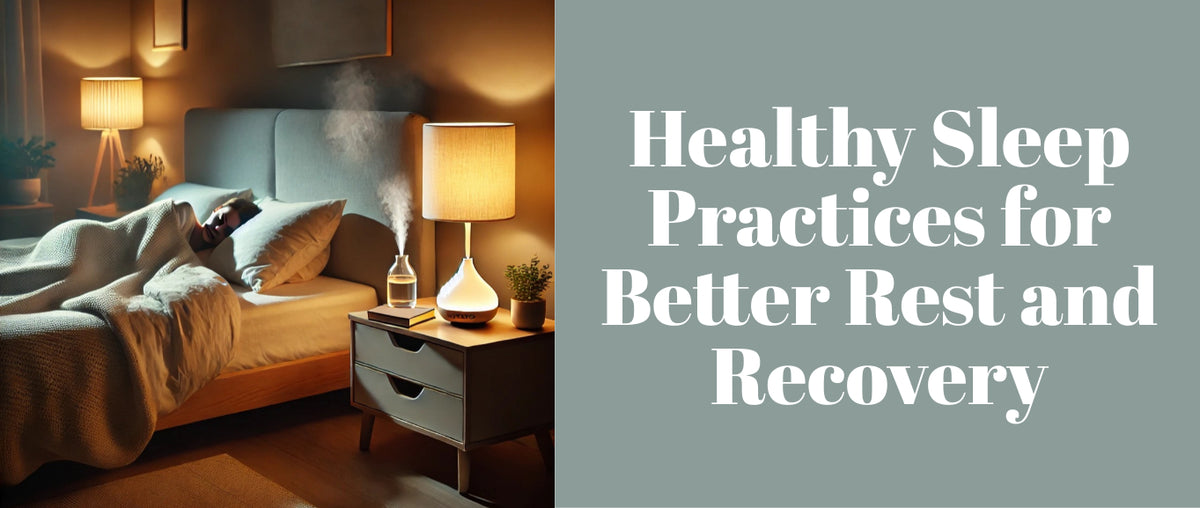Healthy Sleep Practices for Better Rest and Recovery
Quality sleep is essential for overall health and recovery. Without adequate rest, your body and mind can’t function optimally, leading to various health issues. Good sleep hygiene practices can make a significant difference in your sleep quality and overall well-being.
Key Takeaways
- Improved Sleep Quality Leads to Better Physical and Mental Health: Consistent, good-quality sleep enhances immune function, cognitive performance, and emotional stability.
- Consistent Sleep Hygiene Practices Can Significantly Enhance Rest and Recovery: Establishing a routine, creating a sleep-inducing environment, and managing stress are crucial for better sleep.
- Various Lifestyle Changes Can Positively Impact Sleep Quality: Diet, exercise, and stress management play essential roles in promoting healthy sleep patterns.
Importance of Sleep for Health and Recovery
Role of Sleep in Physical Health
Sleep is vital for various bodily functions, including tissue repair, muscle growth, and hormone regulation. During sleep, your body produces essential hormones like growth hormone, which is crucial for muscle development and tissue repair. Additionally, sleep plays a crucial role in boosting the immune system, helping your body fend off illnesses and infections.
- Hormone Regulation: Hormones like cortisol, which helps regulate metabolism and the body's response to stress, are balanced during sleep.
- Tissue Repair: Deep sleep stages are crucial for tissue growth and muscle repair.
- Immune System: Sleep enhances the production of cytokines, which are proteins that help the immune system respond to infections and inflammation.
Mental Health Benefits of Good Sleep
Adequate sleep enhances cognitive functions, such as memory, attention, and problem-solving skills. It also stabilizes your mood and reduces the risk of mental health disorders like depression and anxiety.
- Cognitive Functions: Proper sleep improves learning, memory consolidation, and problem-solving skills.
- Emotional Stability: Consistent sleep helps regulate emotions and mood, reducing irritability and the likelihood of mood disorders.
- Mental Health: Regular sleep reduces the risk of developing mental health conditions such as depression and anxiety.
Common Sleep Disorders and Their Impact
Insomnia
Insomnia is characterized by difficulty falling or staying asleep. It can lead to daytime fatigue, irritability, and impaired concentration. Chronic insomnia increases the risk of health problems such as hypertension and heart disease.
- Symptoms: Difficulty falling asleep, waking up frequently during the night, and not feeling rested upon waking.
- Health Risks: Increased risk of cardiovascular diseases, diabetes, and compromised immune function.
Sleep Apnea
Sleep apnea causes interruptions in breathing during sleep, leading to frequent awakenings. This disorder can result in severe health issues, including high blood pressure, heart disease, and stroke.
- Symptoms: Loud snoring, episodes of stopped breathing, and excessive daytime sleepiness.
- Health Risks: Increased risk of hypertension, heart attacks, and strokes.

Restless Legs Syndrome
Restless legs syndrome (RLS) involves uncomfortable sensations in the legs, causing an urge to move them. This condition disrupts sleep and can lead to daytime drowsiness and decreased productivity.
- Symptoms: Unpleasant sensations in the legs, particularly in the evening, and relief upon movement.
- Health Risks: Impact on sleep quality leading to fatigue, decreased concentration, and increased stress.
Good Sleep for Good Health
Quality sleep is essential for maintaining good health. It supports various bodily functions, helps in the repair and rejuvenation of tissues, and plays a critical role in cognitive functions.
- Physical Health: Supports cardiovascular health, regulates metabolism, and maintains hormone balance.
- Mental Health: Enhances cognitive abilities, emotional stability, and overall mental well-being.
What is Sleep Hygiene?
Sleep hygiene refers to a set of practices and habits that contribute to good sleep quality. These practices are essential for maintaining a healthy sleep routine and ensuring adequate rest.
- Consistency: Maintaining regular sleep and wake times.
- Environment: Creating a sleep-conducive environment.
- Behavioral Practices: Engaging in activities that promote relaxation before bed.
Establishing a Healthy Sleep Routine
Consistent Sleep Schedule
Maintaining a regular sleep schedule helps regulate your circadian rhythm. Going to bed and waking up at the same time every day, even on weekends, can significantly improve your sleep quality.
- Circadian Rhythm: Your body's internal clock that regulates sleep-wake cycles.
- Benefits: Improved sleep quality, better mood, and enhanced overall health.
Creating a Sleep-Inducing Environment
Your sleep environment plays a crucial role in your ability to fall and stay asleep. Ensure your bedroom is cool, dark, and quiet. Invest in a comfortable mattress and pillows to support restful sleep.
- Temperature: Ideal sleep temperature is between 60-67°F (15-19°C).
- Lighting: Use blackout curtains to eliminate light, which can disrupt sleep.
- Noise: Consider using white noise machines or earplugs to block out disruptive sounds.
Pre-Sleep Rituals
Developing pre-sleep rituals can signal to your body that it's time to wind down. Avoid stimulating activities before bed and engage in relaxation techniques like reading, meditating, or taking a warm bath.
- Relaxation Techniques: Practices such as deep breathing, meditation, and progressive muscle relaxation.
- Activities to Avoid: Intense exercise, heavy meals, and caffeine consumption close to bedtime.
Turn Off Electronic Devices Before You Go to Sleep
Electronic devices emit blue light, which can interfere with your sleep. Turn off all devices at least an hour before bedtime to help your body prepare for sleep.
- Blue Light Impact: Suppresses melatonin production, making it harder to fall asleep.
- Alternatives: Engage in relaxing activities like reading a book or listening to calming music.
Go Dark Before Going to Sleep
Creating a dark environment by using blackout curtains or an eye mask can enhance sleep quality. Darkness signals your body to produce melatonin, the hormone responsible for regulating sleep.
- Melatonin Production: Darkness stimulates the release of melatonin, promoting sleepiness.
- Practical Tips: Use eye masks, blackout curtains, and eliminate all sources of light in the bedroom.
Crafting the Ideal Bedtime Routine
A consistent bedtime routine helps your body recognize that it's time to sleep. Include activities that relax you, such as listening to calming music, doing gentle stretches, or practicing mindfulness meditation.
- Routine Activities: Gentle stretches, warm baths, and reading.
- Benefits: Signals your body to wind down and prepares you for restful sleep.
Diet and Sleep
Foods that Promote Sleep
Certain nutrients and foods can enhance sleep quality. Incorporate items like vegan cheese, Unsalted Butter, Garlic Butter, vegan butter , Kombucha , Healthy Drinks, and Cashew Butter into your diet. Eating these plant based foods can improve your sleep due to their natural sleep-promoting properties.
- Sleep-Promoting Nutrients: Tryptophan, magnesium, and melatonin found in certain foods.
- Beneficial Foods: Nuts, seeds, whole grains, and certain fruits and vegetables.
Foods and Substances to Avoid
Avoid consuming caffeine and alcohol close to bedtime, as they can disrupt your sleep. Heavy meals and spicy foods should also be limited in the evening to prevent indigestion and discomfort during the night.
- Caffeine: Found in coffee, tea, chocolate, and some medications.
- Alcohol: Although it may help you fall asleep, it disrupts sleep cycles and reduces sleep quality.
Cut Caffeine and Curb Alcohol
Caffeine and alcohol can negatively impact sleep quality. Opt for caffeine-free beverages like kombucha and limit alcohol consumption to enhance your sleep.
- Caffeine-Free Alternatives: Herbal teas and decaffeinated beverages.
- Alcohol Impact: Reduces REM sleep, leading to less restorative sleep.
Implementing Dietary Strategies to Enhance Sleep
Adopt dietary strategies that support good sleep, such as consuming cholesterol-free foods, low-fat mayonnaise, and Healthy Snacks for Kids. A healthy eating plan rich in sleep-promoting nutrients can significantly improve your sleep quality.
- Balanced Diet: Incorporate a variety of fruits, vegetables, lean proteins, and whole grains.
- Timing of Meals: Avoid large meals close to bedtime; opt for light snacks if needed.
Physical Activity and Sleep
Benefits of Regular Exercise
Regular physical activity can enhance sleep quality by reducing stress and anxiety. Exercise promotes deeper and more restorative sleep.
- Stress Reduction: Physical activity helps lower cortisol levels and reduce stress.
- Sleep Quality: Regular exercise contributes to longer and deeper sleep cycles.
Types of Exercises
Engage in activities like walking, swimming, or yoga to promote better sleep. Gentle exercises in the evening can help you wind down and prepare for a restful night.
- Morning Exercise: Boosts energy and mood throughout the day.
- Evening Exercise: Gentle activities like yoga and stretching can relax your body and mind.
Which Is Most Important: Diet, Exercise, or Sleep?
Each element plays a crucial role in maintaining overall health. A balanced approach that includes a healthy diet, regular exercise, and good sleep hygiene practices is essential for optimal health.
- Interconnected Benefits: Good nutrition, physical activity, and quality sleep all contribute to overall well-being.
- Holistic Approach: Prioritize all three aspects to achieve the best health outcomes.
Managing Stress for Better Sleep
Stress and Its Impact on Sleep
Stress can significantly impact sleep patterns, making it difficult to fall and stay asleep. Identifying and managing stressors is crucial for improving sleep quality.
- Impact on Sleep: Stress can cause insomnia and poor sleep quality.
- Common Stressors: Work pressure, financial worries, and personal relationships.
Stress-Reduction Techniques
Incorporate stress-reduction techniques like mindfulness, meditation, and progressive muscle relaxation into your daily routine. These practices can help calm your mind and prepare your body for sleep.
- Mindfulness and Meditation: Techniques that promote relaxation and reduce anxiety.
- Progressive Muscle Relaxation: A method of tensing and relaxing muscle groups to reduce physical tension.
Sleep Hygiene Practices
Maintaining a Sleep-Friendly Environment
Create a sleep-friendly environment by reducing noise and using blackout curtains. A cool, dark, and quiet room can significantly enhance your sleep quality.
- Noise Reduction: Use earplugs or white noise machines to block out disruptive sounds.
- Temperature Control: Keep your bedroom cool for optimal sleep conditions.
Limiting Screen Time Before Bed
Reducing screen time before bed helps minimize exposure to blue light, which can interfere with sleep. Instead of using electronic devices, consider reading a book or engaging in a relaxing activity.
- Blue Light Exposure: Blue light from screens can suppress melatonin production.
- Alternative Activities: Reading, journaling, or listening to music.
Why Is Sleep Important for Athletes?
Quality sleep is essential for athletes as it supports Muscle Recovery, enhances performance, and reduces the risk of injuries. Adequate sleep is crucial for optimal athletic performance.
- Muscle Recovery: Sleep promotes the repair and growth of muscle tissues.
- Performance Enhancement: Proper rest improves reaction times, accuracy, and endurance.
How Does Sleep Affect Athletic Performance?
Sleep impacts various aspects of athletic performance, including reaction time, accuracy, and endurance. Athletes who prioritize sleep tend to perform better and recover faster.
- Reaction Time: Faster reflexes and improved decision-making.
- Accuracy: Enhanced focus and precision in movements.
How Is Sleep Different for Athletes?
Athletes have unique sleep requirements due to their physical demands. They often need more sleep and recovery time compared to non-athletes.
- Increased Sleep Needs: More sleep required for muscle recovery and energy restoration.
- Sleep Patterns: Athletes may need to adjust their sleep schedules to accommodate training and competition times.
Sleep Hygiene Tips for Athletes
Athletes should follow specific sleep hygiene practices, such as maintaining a consistent sleep schedule, creating a conducive sleep environment, and managing stress effectively.
- Consistent Schedule: Go to bed and wake up at the same time every day.
- Sleep Environment: Ensure a quiet, dark, and cool bedroom.
- Stress Management: Incorporate relaxation techniques to reduce pre-competition anxiety.
The Advantages of Healthy Sleep Habits
Adopting healthy sleep habits can lead to numerous benefits, including improved physical and mental health, better performance at work or school, and enhanced overall well-being.
- Physical Health: Reduced risk of chronic illnesses and improved immune function.
- Mental Health: Better mood regulation and reduced stress levels.
- Performance: Enhanced productivity, concentration, and creativity.
Importance of Professional Help
When to Seek Medical Advice
If sleep problems persist despite good sleep hygiene practices, it may be time to seek medical advice. A healthcare professional can help diagnose and treat underlying sleep disorders.
- Persistent Issues: Chronic insomnia, severe snoring, or daytime sleepiness.
- Health Risks: Untreated sleep disorders can lead to serious health complications.
Types of Sleep Specialists
Various specialists, including sleep medicine physicians, psychologists, and neurologists, can provide expert help for sleep disorders.
- Sleep Medicine Physicians: Doctors who specialize in diagnosing and treating sleep disorders.
- Psychologists: Provide cognitive-behavioral therapy for insomnia (CBT-I).
- Neurologists: Treat neurological conditions that affect sleep.
Sleep Studies
Sleep studies are diagnostic tools used to identify sleep disorders. They involve monitoring your sleep patterns, brain activity, and other physiological functions during sleep.
- Polysomnography: A comprehensive test that records brain waves, oxygen levels, heart rate, and breathing.
- Home Sleep Tests: Simpler tests that can be conducted at home to diagnose conditions like sleep apnea.
Conclusion
Quality sleep is essential for overall health and recovery. By adopting good sleep hygiene practices, maintaining a healthy diet, and managing stress, you can significantly improve your sleep quality. Remember to seek professional help if sleep problems persist, as addressing these issues is crucial for your overall well-being.
Do you enjoy vegan food? We have a list of vegan restaurants in India to help you find delicious options in your area!










